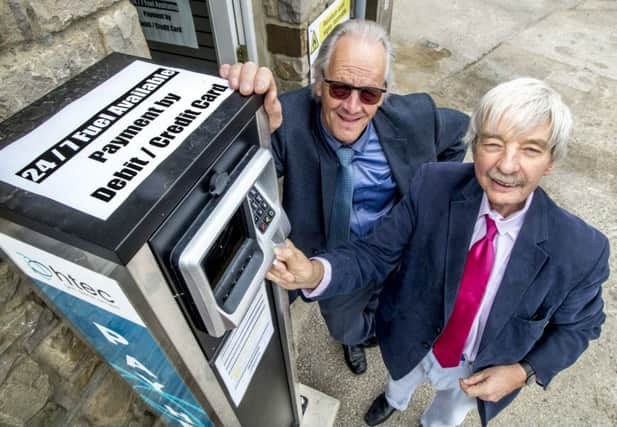Round the clock fuel in Dales


A grant from the district council has allowed the Dale Head Community Garage in Hawes to install a terminal to serve local residents, businesses and visitors 24 hours a day, seven days a week.
The garage was awarded £15,567 from Richmondshire District Council’s Economic Growth Fund. The council hopes the machine, which takes credit and debit cards, will draw in out-of-hours customers who would have otherwise have had to venture out of the area, and to improve the nighttime economy of the district.
Advertisement
Hide AdAdvertisement
Hide AdThe garage, a traditional countryside forecourt surrounded by stone buildings and across the road from the village primary school, is around 25 miles in any direction from the next nearest filling station. It was taken over last November by the not-for-profit Upper Dales Community Partnership, and has reported a 40 per cent rise in business since then.
John Blackie, an independent councillor on the district and county authorities, who is also executive chairman of the partnership, said: “Hawes is the very first deeply rural community in England to have a garage providing round the clock fuel.
“We are 60 miles from the nearest hospital, so for a critical life or death emergency that is vital.”
He said that in the first three nights of round-the-clock operation, the garage had sold fuel worth £1,300 of fuel, which would otherwise have had to be bought later or elsewhere,
Advertisement
Hide AdAdvertisement
Hide AdDescribing the results as “incredible”, Coun Blackie added: “We have had very strong support from local businesses, including the Wensleydale Creamery just up the road, and the Yorkshire Dales National Park Authority.
“The service helps firms to attract employees into the Upper Dales.”
The community partnership, created 21 years ago, is the largest of its kind in the North, and runs three post offices and a sorting office in Upper Wensleydale, as well as internet cafes and a library, and the Little White Bus, which connects, Hawes, Leyburn and other villages with Bedale and Northallerton.
It has 25 full-time and part-time employees and 60 volunteers, four of whom work alongside the regular staff at the garage.
Advertisement
Hide AdAdvertisement
Hide AdCoun Blackie, who called the organisation “an antidote to austerity”, said it had taken advantage of a government subsidy for rural areas to maintain market prices at the garage.
The Richmondshire growth fund, designed to support commercial projects that help to deliver growth in the local economy, has handed out more than £237,000 since it was launched in 2016.
The district council’s deputy leader, Ian Threlfall, said: “Through this scheme we are looking to see economic growth – and the garage in Hawes is a good example of how we can keep business in the Dales 24 hours a day, seven days a week.
“I am sure this will keep people in the Dales. That will have an impact not just on the garage’s business but on the business of other traders in the towns and villages.”
Advertisement
Hide AdAdvertisement
Hide AdThe council says the scheme has been welcomed especially by businesses with employees living locally but working away from Upper Wensleydale, who can extend their working hours in the knowledge that they will be able to top up ready for the next day’s work.
News of the garage’s expansion comes in the week that the county council in North Yorkshire warned of a “rural premium” that makes transport costs in county areas 10 times higher than in neighbouring cities and which was threatening the continued provision of free school transport for pupils.
The annual cost per pupil in the area was said by the County Councils Network, which speaks for rural authorities, to be £204, compared with just £12 in Sheffield and £7 in Hull. Transport costs in the East Riding are said to be £103 per pupil.
The organisation said the disparity was due to the higher numbers of pupils eligible for free transport in rural areas compared to urban ones, and was exacerbated by housing growth.
Advertisement
Hide AdAdvertisement
Hide AdThe figures were calculated from government data which takes each council’s annual spend on school transport, divided by the total number of pupils in that area.
Ian Hudspeth, the organisation’s spokesman for education, who is also leader of Oxfordshire County Council, said: there was “clear evidence” that school transport services in rural county areas were significantly more expensive than in towns and cities.
He said: “We pay a rural premium in delivering these transport services, and it is becoming increasingly difficult to maintain subsidies.”